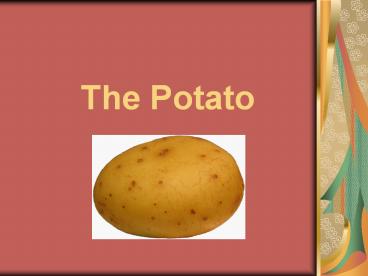The Potato - PowerPoint PPT Presentation
1 / 23
Title:
The Potato
Description:
The Potato The potato originates from Peru. The earliest domesticated potato is believed to date back to around 8000BC. Potatoes were definitely being cultivated in ... – PowerPoint PPT presentation
Number of Views:195
Avg rating:3.0/5.0
Title: The Potato
1
The Potato
2
- The potato originates from Peru.
- The earliest domesticated potato is believed to
date back to around 8000BC. - Potatoes were definitely being cultivated in the
Peruvian highlands by 3000 BC, spreading to
coastal regions by about 2000BC
3
- The Latin botanical name for the potato is
Solanum tuberosum. - The Quechua word for this vegetable is papa.
- The English word potato comes from the Spanish
term patata. This emanates, in turn, from the
Spanish pronunciation of a name used by Caribbean
Indians for the plant we now know as the sweet
potato.
4
- Potatoes are very versatile.
- They can grow at altitude and in poor soil.
- They require little preparation less than wheat
or maize. - They are a good source of nutrition. They provide
carbohydrate and vitamins A, D and C. - There are many different varieties of potato.
5
(No Transcript)
6
(No Transcript)
7
- Potatoes are the staple food of the Incas.
- Incas also cultivate other plants with edible
roots, such as the yucca and the oca. - Incas use a type of spade called a taclla for
planting potatoes. - Felipe Guaman Poma, Nueva Corónica y Buen
Gobierno (1615)
8
(No Transcript)
9
Chuño
10
(No Transcript)
11
Ritual Connotations
- The Incas give some potatoes charming names, like
one who cries for her Inca and aborted guinea
pig - Acosta claims that Incas worshipped potatoes that
had a strange shape, called llallhuas - Chilean legend relates that potatoes were created
from the body of an Indian chief who tried to spy
on the Gods and was buried underground as
punishment.
12
Spanish discovery
- First mention of potato by a Spaniard is in
1530s. - Spanish feed potatoes to African slaves and to
Indians labouring in the silver mines at Potosí
in Bolivia. - Potatoes not transmitted to Europe until the
1570s.
13
Reception in Europe
- Pedro Cieza de León The potato, when boiled, is
as tender as a cooked chesnut. (1538) - Father Bernabé Cobo The ordinary bread they
the Incas eat is maize, quinua or chuño, or
dry, fresh papas potatoes. - José de Acosta Describes potatoes as the bread
of that land. (1590)
14
- Potato considered nutritious.
- Castellanos The potato is a food very
acceptable to the Indians, and a dainty dish even
for the Spaniards. (1536) - Berbabé Cobo With chuño the Spanish women
make a flour more white and fine than that from
wheat, from which they make starch, sponge cakes
and all delicacies which they usually make from
almonds and sugar and with the cooked green
potatoes that make the most delicious fritters.
(1653) - López de Gomara Men live to the age of a
hundred and more years not having maize they use
the potato as food
15
- Potatoes believed to have medicinal properties.
Seen as a beneficial to certain complaints and as
an aphrodisiac. - William Salmon The leaves of the potato are
manifestly hot and dry in the beginning of the
2nd degree, as manifestly appear by the taste.
But the roots are temperate in respect to heat or
cold, dryness and moisture they astringe, are
moderately diuretic, stomatick, chylisick,
analeptic and spermatogenetic. They nourish the
whole body, restore in consumptions and provoke
lust. (1710) - Potatoes good for fluxes of the belly,
ulceration of the lungs and impotency in men
and barrenness in women.
16
Opposition
- Potato evokes suspicion.
- First tuber that Europeans have seen.
- Related to poisonous plants like deadly
nightshade and henbane. - Believed to cause leprosy because lumpy shape
resembles nodules on lepers hands. Doctrine of
signatures.
17
- Enlightenment reformers promote the potato as a
substitute for wheat in times of famine. - Antoine Parmentier champions potato consumption
in France. - Frederick the Great encourages potato consumption
in Prussia. - British adopt the potato during the Napoleonic
Wars.
18
(No Transcript)
19
Ireland
- Irish embrace the potato.
- Climatic conditions suit it. Warm and wet.
- Potato grows in small plots and poor soil.
- Requires little equipment to cultivate or
prepare. - Edward Wakefield estimates in 1811 that the
average Irishmen consumes 5.5 pound of potatoes
every day.
20
The Potato Debate
- 1780s-1830s English commentators debate whether
the potato is a blessing or a curse to the Irish. - William Cobbett says it perpetuates poverty.
- Thomas Malthus says it causes over-population.
- Arthur Young thinks it is nutritious and enables
Irish to survive in adverse conditions. - Compare with the Tortilla Discourse in Mexico.
21
Famine
- Potato blight strikes Ireland in 1845.
- Continues into 1846, killing 90 of the crop.
- 1 million Irish die from starvation, or related
diseases. - 1.3 million Irish emigrate as a result of the
famine.
22
(No Transcript)
23
(No Transcript)































